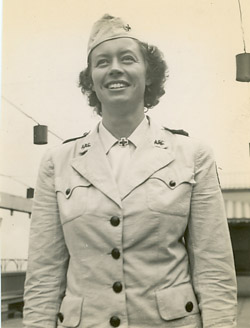Background on Maida L. Riggs

Maida Riggs, ca.1944
Maida Leonard Riggs was born on May 16, 1915, in Grafton, Mass., to Alfred D. Riggs, Sr., and Winifred Leonard Riggs, and graduated from Grafton High School in 1932. She was one of four children, along with Amy, Doris (known as Dot), and Alfred, Jr. Enrolling at Massachusetts State College with the class of 1936, Riggs majored in Distributed Sciences and was active in the YWCA, Home Economics Club, student government, and athletics. She was Swimming Manager of the Women's Athletics Association and was on the Rifle Team, and she was a member of the sorority Phi Zeta, whose MSC chapter was founded in 1932, not long before Riggs arrived on campus. She was tapped to be a "floor captain" in Abigail Adams House, the women's dormitory. Receiving her diploma from MSC in 1937, Riggs enrolled at the Bouve-Boston School of Physical Education, completing the Three-Year Normal Course in May, 1939. The following September, she began teaching at Sweet Briar College in Virginia, exploring the area on her bicycle, spending weekends in the Women's Athletic Association cabin in nearby woods, and following the developing war news reported on the radio.
In 1943, determined to serve the war effort abroad, she went to enlist in the U.S. Air Force but found that being a woman meant assignments restricted to "teaching drill tactics and conditioning exercises in the USA," as she later wrote. Instead, she joined the American Red Cross and was sent to Europe as a "Clubmobiler." Part of Group G, she was in England for about a year, and then went to France, Belgium, Holland, and Germany, remaining on the continent until October 1945. Although her duties chiefly consisted of making and delivering doughnuts and coffee to the troops from the remodeled buses that functioned as canteens on wheels, the Clubmobilers functioned as support troops who ventured as far into the action as required. Riggs later recalled landing at Utah Beach in August 1944 the day after General Patton did, noting that women's presence at the invasion of Normandy, among other major battles, tended to be left out of the historical narrative. Exciting, challenging, and strenuous, Riggs's wartime experiences overseas were just the beginning of a life devoted to seizing any opportunity for travel, with an emphasis on outdoor adventures. In the decade following the war, she led bicycle trips to Europe for the American Youth Hostels and the Experiment in International Living and ended up touring most of western Europe by bike.
Riggs spent a year as director of admissions at the Bouve-Boston School of Physical Education, then taught physical education in Newton and Scituate public schools before joining the School of Physical Education faculty at UMass Amherst in 1951. There she established the Teacher Education in Physical Education program, but she continued to find time to travel, mostly in the summers. She received a master's degree in physical education from the University of California, Berkeley, in 1957, earning it over the course of three summers. Particularly fond of the Scandinavian countries, she spent the summer of 1959 at the University of Oslo in Norway in the university's first international program for physical education teachers to which Americans were invited, then took the opportunity to travel into the far north of Finland. A few years later, in 1963, she was in Ivory Coast as a Peace Corps instructor, training Americans in physical education. At sixty-two, she went on a 200-mile trek through the foothills of the Himalayas in Nepal.
She also taught or lectured at Mount Holyoke College, Smith College, the University of Utah, and in England and Norway, and she participated in educational seminars held in the Soviet Union, Mongolia, Australia, New Zealand, China, and Japan, where she was able to observe nursery schools and how they provided for physical activity for their young students. Also a specialist in early childhood education, she published Jump to Joy: Helping Children Grow Through Active Play, concerning physical, mental, and emotional development in young children and featuring her own photographs, in 1980. Retiring from UMass in 1979, Riggs remained connected to the university as both an emeritus professor and an alumna, living and gardening in Hadley. She continued to travel, and she researched her family's genealogy and history, publishing a collection of the letters of her great-grandmother, a nineteenth-century missionary to the Sioux in Minnesota, as A Small Bit of Bread and Butter. Riggs also compiled her own World War II letters into the foundation of her memoir, Dancing in Paratrooper Boots. Around 2000, she put together a list of women from the classes of 1928 to 1946 of the Massachusetts Agricultural College and Massachusetts State College who joined military services. Riggs died February 27, 2011.

